动词时态的分类练习
动词时态练习(含答案和解析)

动词时态练习(含答案和解析)一、单项选择题1. She ___________ to London last week. (go)- A. goes- B. is going- C. went- D. will go答案:C 解析:表示过去发生的动作,应使用一般过去时。
2. By the time he arrives, we ___________ for three hours. (wait)- A. will wait- B. are waiting- C. have been waiting- D. will have waited答案:C 解析:表示从过去的某一时刻开始一直持续到现在的动作,应使用现在完成进行时。
3. They ___________ to the new house until next week. (not move)- A. don't move- B. didn't move- C. won't move- D. haven't moved答案:C 解析:表示将来某一时刻之前不会发生的动作,应使用一般将来时的否定形式。
4. I ___________ TV when he ___________ the room. (watch, enter)- A. was watching, entered- B. watched, entered- C. am watching, enters- D. watched, enters答案:A 解析:表示过去某一时间点正在进行的动作,此时另一个动作突然发生,应使用过去进行时和一般过去时。
5. She ___________ in the garden when it ___________ raining. (work, start)- A. was working, started- B. worked, started- C. is working, starts- D. works, starts答案:A 解析:表示过去某一时间点正在进行的动作,此时另一个动作突然发生,应使用过去进行时和一般过去时。
人教版中考英语专项训练动词的时态练习题(含答案)

人教版中考英语专项训练动词的时态练习题(含答案)一、初中英语动词的时态1. My grandma to the radio when I got home just now.A.listensB. listenedC. is listeningD. was listening【答案】D【解析】句意:我刚才到家的时候我的奶奶正在听广播。
结合语境理解可知,当我到家这一时刻,另一个动词正在进行,when引导的时间状语从句是一般过去时,主句表达的是过去正在进行的动作,故句子的时态为过去进行时,答案为皿2 ・—Where's your father; Tom?—He newspaper in the study.A.readsB. readC. is readingD. has read【答案】C【解析】句意:-汤姆,你爸爸在哪里?--他在书房里读报纸。
根据问句"汤姆,你爸爸在哪里?",判断答语的句意是"他正在书房里读报纸。
”即设空处的动作在说话时刻正在进行着,所以句子用现在进行时,现在进行时的构成:am/is/are+动词的现在分词,故答案为C。
3.— Where is Mr. Wu?—He together with his students singing by the lake .A. is practisingB. are practisingC. will practiseD. would practise【答案】A【解析】【详解】句意:一一胡先生在哪里?一一他和他的同学们一起在湖边练习唱歌。
A. is practising正在练习;单数;B. are practising i|;在练习,复数:C. will practise将去练习;—般将来时:D. would practise会去练习,过去将来时。
根据上文Where is Mr. Wu?可知下文用现在进行时,其结构是be doing的形式,主语是he, together with his students在句中做状语;这里be动词用is。
英语16种时态及练习题附答案
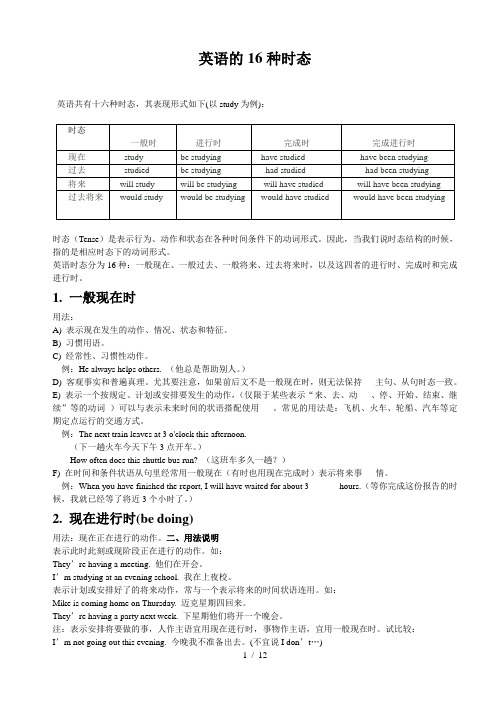
英语的16种时态英语共有十六种时态,其表现形式如下(以study为例):时态(Tense)是表示行为、动作和状态在各种时间条件下的动词形式。
因此,当我们说时态结构的时候,指的是相应时态下的动词形式。
英语时态分为16种:一般现在、一般过去、一般将来、过去将来时,以及这四者的进行时、完成时和完成进行时。
1. 一般现在时用法:A) 表示现在发生的动作、情况、状态和特征。
B) 习惯用语。
C) 经常性、习惯性动作。
例:He always helps others. (他总是帮助别人。
)D) 客观事实和普遍真理。
尤其要注意,如果前后文不是一般现在时,则无法保持主句、从句时态一致。
E) 表示一个按规定、计划或安排要发生的动作,(仅限于某些表示“来、去、动、停、开始、结束、继续”等的动词)可以与表示未来时间的状语搭配使用。
常见的用法是:飞机、火车、轮船、汽车等定期定点运行的交通方式。
例:The next train leaves at 3 o'clock this afternoon.(下一趟火车今天下午3点开车。
)How often does this shuttle bus run? (这班车多久一趟?)F) 在时间和条件状语从句里经常用一般现在(有时也用现在完成时)表示将来事情。
例:When you have finished the report, I will have waited for about 3 hours.(等你完成这份报告的时候,我就已经等了将近3个小时了。
)2. 现在进行时(be doing)用法:现在正在进行的动作。
二、用法说明表示此时此刻或现阶段正在进行的动作。
如:They’re having a meeting. 他们在开会。
I’m studying at an evening school. 我在上夜校。
表示计划或安排好了的将来动作,常与一个表示将来的时间状语连用。
如:Mike is coming home on Thursday. 迈克星期四回来。
初二英语动词时态专项练习50题
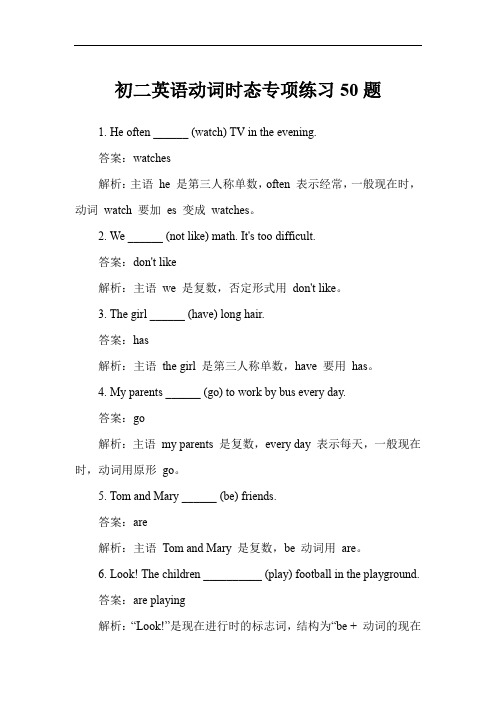
初二英语动词时态专项练习50题1. He often ______ (watch) TV in the evening.答案:watches解析:主语he 是第三人称单数,often 表示经常,一般现在时,动词watch 要加es 变成watches。
2. We ______ (not like) math. It's too difficult.答案:don't like解析:主语we 是复数,否定形式用don't like。
3. The girl ______ (have) long hair.答案:has解析:主语the girl 是第三人称单数,have 要用has。
4. My parents ______ (go) to work by bus every day.答案:go解析:主语my parents 是复数,every day 表示每天,一般现在时,动词用原形go。
5. Tom and Mary ______ (be) friends.答案:are解析:主语Tom and Mary 是复数,be 动词用are。
6. Look! The children __________ (play) football in the playground.答案:are playing解析:“Look!”是现在进行时的标志词,结构为“be + 动词的现在分词”,children 是复数,所以be 动词用are,play 的现在分词是playing。
7. Listen! Someone __________ (sing) in the next room.答案:is singing解析:“Listen!”是现在进行时的标志词,结构为“be + 动词的现在分词”,someone 是不定代词,作主语时视为单数,所以be 动词用is,sing 的现在分词是singing。
8. We __________ (have) an English class now.答案:are having解析:“now”是现在进行时的标志词,结构为“be + 动词的现在分词”,we 是复数,所以be 动词用are,have 的现在分词是having。
英语动词时态练习

英语动词时态练习一般现在时练1. 她(常常/从不)喝咖啡。
2. 你经常在家吃饭吗?3. 他们喜欢看电影吗?4. 我妈妈每天晚上都(在家做饭/叫外卖)。
5. 我们(经常/很少)去公园玩。
现在进行时练1. 你现在在干什么?2. 他们正在看电视吗?3. 她每天早上都在跑步。
4. 我们(正在做作业/已经做完了作业)。
5. 他现在(在研究/在玩手机)。
过去时练1. 昨天他去了哪里?2. 你昨天晚上做了什么?3. 他们上个周末去了海边。
4. 我们(昨天/上个月)去了韩国旅行。
5. 她昨晚(看了电影/打了游戏)。
过去进行时练1. 昨天下午三点钟他在做什么?2. 你们昨晚九点还在做作业吗?3. 他们去年这个时候正在旅游。
4. 我们(两年前/去年这个时候)都还在上学。
5. 她昨天晚上七点一直在跟朋友聊天。
一般将来时练1. 你下个月的计划是什么?2. 他们周末要去哪里?3. 我们明年要搬家。
4. 你们什么时候结束考试?5. 我们明年放假时要去旅行。
现在完成时练1. 你有没有去过中国?2. 她已经吃过晚饭了吗?3. 他们今天早上已经去上课了。
4. 我们(从来没有/已经)去过非洲。
5. 我们上个星期刚刚完成了这个项目。
过去完成时练1. 他们到达机场的时候航班已经起飞了。
2. 你们昨天晚上八点已经回家了吗?3. 我们去年已经交了税。
4. 他们在我们到达之前已经抵达了。
5. 我们去过很多国家,但从来没有去过南极洲。
以上是英语动词时态的练习题,希望对大家的英语学习有所帮助。
七种时态练习题

七种时态练习题一般现在时:(1)表示现在的状态,用系动词表示(am, is are,look,feel,sound,smell, taste,become,get等)(2)表示经常或习惯性的动作,用实义动词原形或单三表示。
时间状语:always/usually/often/sometimes/hardly ever/never/every day/How often..?或没有任何时间。
一般过去时:(1)表示在过去某个时间发生的动作,用实义动词的过去式表示,如:worked(2)表示过去存在的状态,用系动词的过去式表示(was, were)时间状语:yesterday/last night/three days ago/in 2004/just now/上下文一般将来时:表示在将来某个时间将要发生的动作或存在的状态,用w i l l+动词原形或be(am, is, are)going to+动词原形(表示打算、计划,准备做的事或表示根据某种迹象推断即将发生或肯定要发生的事)时间状语:tomorrow(morning/afternoon/evening)this afternoon/evening,tonight,nextweek/year/month/Friday…in 2050,in two days, in the future或上下文。
现在进行时:选择题练习现在进行时表示现在正在进行或发生的动作,用be(am,is,are)+doing表示时间状语:now, look, listen,It’s …o’clock, Where is Mary? Don’t talk loudly. Be quiet.过去进行时:表示过去某段时间或某一时刻正在发生或进行的行为或动作。
用be(was,were)+doing表示时间状语:at seven o’clock yesterday morning, at this time last nig ht ,at this time yesterday, at that time/moment或用于含有when或while /as引导的时间状语从句中或主句中现在完成时:用have/has+动词的过去分词表示(1)表示过去发生或已经完成的某一动作对现在造成的影响和结果。
动词的时态专题练习

动词的时态专题练习一、初中英语动词的时态1.By the time I ________ on the TV, Beckham ________ two goals.A.turned; have scored B.turned; had scoredC.had turned; have scored D.had turned; had scored【答案】B【解析】句意:当我打开电视的时候,贝克汉姆已经进了两个球。
考查动词时态辨析题。
本句是时间状语从句,by the time到…时候为止,用于一般过去时,可排除CD选项。
从句用一般过去时,主句用过去完成时,需用“had+过去分词”结构,可排除A;根据句意结构,可知选B。
2.— Did you sleep well last night?—Far from that! One of my neighbours ▲ music pretty loud.A.plays B.was playing C.is playing D.would play【答案】B【解析】句意:-----你昨晚睡得好吗?------远非如此!我的一个邻居在大声演奏音乐。
A. plays一般现在时态;B. was playing 过去进行时态;C. is playing 现在进行时态; D. would play过去将来时态。
结合语境可知,昨晚睡不好觉的原因是当时有人在演奏音乐,故用过去进行时态来描述,答案为B。
3.My grandparents in that city since they got married.A.will live B.have lived C.live D.were living【答案】B【解析】句意:自从结婚以来,我祖父母就住在那个城市。
since they got married是表示截止到目前为止的时间段,主句要用现在完成时态,故答案为B。
4.He told me that he ________ here for five minutes.A.has comeB.had arrivedC.had beenD.had come【答案】C【解析】句意:他告诉我他到这儿5分钟了。
人教版小学六年级英语时态练习题及答案
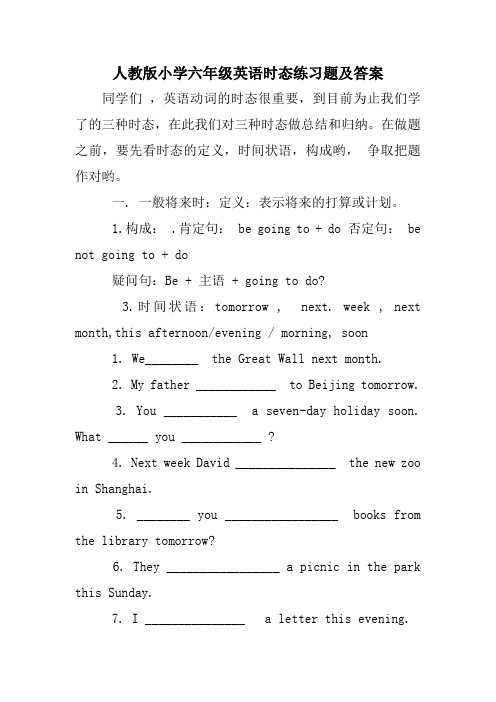
人教版小学六年级英语时态练习题及答案同学们,英语动词的时态很重要,到目前为止我们学了的三种时态,在此我们对三种时态做总结和归纳。
在做题之前,要先看时态的定义,时间状语,构成哟,争取把题作对哟。
一. 一般将来时:定义:表示将来的打算或计划。
1.构成: .肯定句: be going to + do 否定句: be not going to + do疑问句:Be + 主语 + going to do?3.时间状语:tomorrow , next. week , next month,this afternoon/evening / morning, soon1. We________ the Great Wall next month.2. My father ____________ to Beijing tomorrow.3. You ___________ a seven-day holiday soon. What ______ you ____________ ?4. Next week David _______________ the new zoo in Shanghai.5. ________ you _________________ books from the library tomorrow?6. They _________________ a picnic in the park this Sunday.7. I _______________ a letter this evening.8. He ___________________ a kite this Saturday.9. ________ he going to ______ a trip tomorrow?10. How _______ Mary ________ to the cinema? He is going there by subway .二. 一般现在时:定义:1. 经常性或习惯性的动作。
【英语】初中英语动词的时态的技巧及练习题及练习题(含答案)及解析
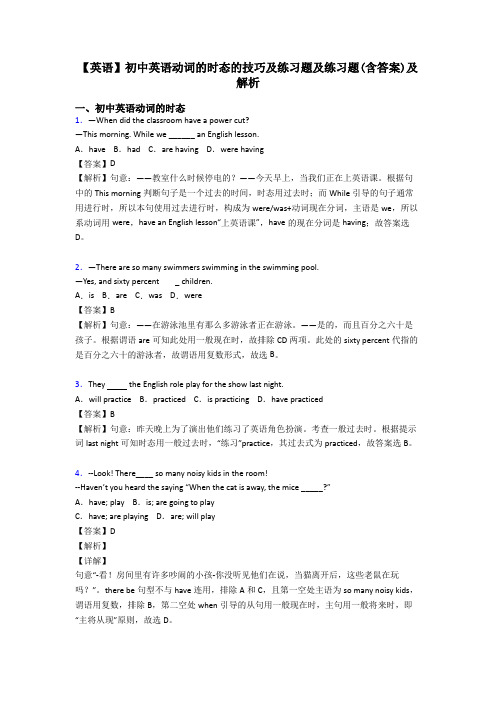
【英语】初中英语动词的时态的技巧及练习题及练习题(含答案)及解析一、初中英语动词的时态1.—When did the classroom have a power cut?—This morning. While we ______ an English lesson.A.have B.had C.are having D.were having【答案】D【解析】句意:——教室什么时候停电的?——今天早上,当我们正在上英语课。
根据句中的This morning判断句子是一个过去的时间,时态用过去时;而While引导的句子通常用进行时,所以本句使用过去进行时,构成为were/was+动词现在分词,主语是we,所以系动词用were,have an English lesson“上英语课”,have的现在分词是having;故答案选D。
2.—There are so many swimmers swimming in the swimming pool.—Yes, and sixty percent _ children.A.is B.are C.was D.were【答案】B【解析】句意:——在游泳池里有那么多游泳者正在游泳。
——是的,而且百分之六十是孩子。
根据谓语are可知此处用一般现在时,故排除CD两项。
此处的sixty percent代指的是百分之六十的游泳者,故谓语用复数形式,故选B。
3.They the English role play for the show last night.A.will practice B.practiced C.is practicing D.have practiced【答案】B【解析】句意:昨天晚上为了演出他们练习了英语角色扮演。
考查一般过去时。
根据提示词last night可知时态用一般过去时,“练习”practice,其过去式为practiced,故答案选B。
动词的时态和语态专题练习

动词的时态和语态专题练习The document was prepared on January 2, 2021高中英语语法时态和语态一.动词的时态时态是谓语动词所表示的动作或情况发生时间的各种形式.英语动词有16种时态,但是常见的只有九种:一般现在时、一般过去时、一般将来时、现在进行时、过去进行时、现在完成时、过去完成时、过去将来时、现在完成进行时.(一)一般现在时do / does1.具体用法1 表示经常性或习惯性动作We always care for each other and help each other. 我们总是互相关心互相帮助.He goes to school every day.2)表示现在的特征或状态He is very happy.Do you sing ----A little.3)表示普遍真理Light travels faster than sound. 光速比声速快.Actions speak louder than words. 行动胜过言语.常与一般现在时态连用的词或短语主要有:often, usually, sometimes, every day, every morning/afternoon, on Sundays/weekends等等.I often go to the cinema on Sundays. 我经常星期天去看电影.He goes to work early every day. 他每天上班很早.二一般过去时 did1表示过去某一特定时间所发生的、可完成的动作或状态,常与表示确切过去时间的词、短语或从句连用.例如:We went to the pictures last night and saw a very interesting film.2表示过去习惯性动作.例如:He always went to class last.I used to do my homework in the library.三一般将来时 will / shall do1表示将来打算进行或期待发生的动作或状态.例如:I shall graduate next year.2一般将来时有时可以表示一种倾向或习惯性动作.如Crops will die without water.You won’t succeed without their support.3 几种替代形式:be going to +v在中广泛使用,表示准备做或将发生的事情.例如:I'm going to buy a house when we've saved enough money.be to +v表示计划安排要做的事,具有"必要"的强制性意义.例如:I am to play tennis this afternoon.be about to +v表示即将发生的事情.例如:He was about to start.be due to +v表示预先确定了的事, 必定发生的事.例如:The train is due to depart in ten minutes.5少数动词如:begin, come, leave, go, arrive, start, stop, return, open, close等的一般现在时可用来表示将来的动作.多用来表示按计划事先安排好即将发生的动作,句中通常还有一个表示将来的时间状语.例如:The meeting begins at seven.The train starts at nine in the morning.四现在进行时 is / are doing1)表示现在某时或某段时间内正在进行的动作.常与现在进行时连用的词组是now, right now,at the mother,for the time being,for the present, 或某个具体的时间几点钟.He is writing a letter now.She is visiting Beijing this week.2)有时用来代替一般现在时态,表示一个经常性动作或状态,这时是为了表示一种感情如赞叹,厌烦,满意,不满等He is always thinking of his work. 表示赞许The boy is always talking in class. 表示不满3 有时用来表示一个在最近按计划或安排要进行的动作这时多有一个表示未来的时间的状语We are leaving on Friday. 我们星期五动身.How many of you are coming to the party五现在完成时have / has done1现在完成时用来表示对目前状况仍有影响的,刚刚完成的动作常与yet,already,just连用,或者过去某一时刻发生的,持续到现在的情况常与for,since连用.例如:I have just finished my homework.Mary has been ill for three days.2常与现在完成时连用的时间状语有:since, for, during, over等引导出的短语;副词already, yet, just, ever, now, before, often, lately, recently等;状语词组this week morning, month, year, so far, up to now, many times, up to the present等.例如:So far, she hasn't enjoyed the summer vacation.There have been a lot of changes since 1978.3完成时态可用在下列结构中:This That, It is was the first second... time +定语从句;This That, It is was the only last + n +定语从句;This That, It is was +形容词最高级+ n +定语从句.如果主句的谓语动词是一般现在时,从句的谓语动词通常用现在完成时;如果主句谓语动词是一般过去时,从句谓语动词通常用过去完成时.例如:1This is one of the rarest questions that have ever been raised at such a meeting.2There was a knock at the door. It was the second time someone had interrupted me that evening.六过去进行时 was / were doing过去进行时表示一个过去的动作发生时或发生后,另一个过去的动作正在进行,或表示过去反复的习惯,常与always,continually,constantly等动词连用.例如:1We were discussing the matter when the headmaster entered.2Whenever I visited him, he was always writing at the desk.七过去完成时 had done1表示过去某时间前已经发生的动作或情况,这个过去的时间可以用by,before等介词短语或一个时间状语从句来表示;或者表示一个动作在另一个过去动作之前已经完成.例如:1We had just had our breakfast when Tom came in.2By the end of last year they had turned out 5, 000 bicycles.2动词expect, hope, mean, intend, plan, suppose, wish, want, desire等用过去完成时,表示过去的希望、预期、意图或愿望等没有实现.例如:I had meant to take a good holiday this year, but I wasn't able to get away.另外两种表示"过去想做而未做的事"的表达方式是:1was / were + to have done sth, 例如:We were to have come yesterday, but we couldn't.2intended expected, hope, meant, planned, supposed, wished, wanted, desired + to have done sth, 如:I meant to have told you about it, but I forgot to do so.3过去完成时常用于以下固定句型:1hardly, scarcely, barely + 过去完成时+ when + 过去时.例如:Hardly had I got on the bus when it started to move.2no sooner +过去完成时+ than +过去时.例如:No sooner had I gone out than he came to see me.3by the end of +过去时间,主句中谓语动词用过去完成时.例如:The experiment had been finished by 4 o'clock yesterday afternoon.八一般过去将来时1. 一般过去将来时的形式Should / would+ 动词原形was / were + 动词-ing形式2. 一般过去将来时常用于宾语从句中,其主语的谓语动词为过去时态,可表示从过去某时看来将要发生的事情,如:He said that he would speak at the meeting.He was sixty-eight. In two years he would be seventy.九现在完成进行时 has / have been doing现在完成进行时表示过去某一时刻之前开始的动作或状态一直延续到过去某一时刻.例如:I have been looking for my lost book for three days, but I still haven't found it.运用动词时态要注意的几个问题一在时间和条件等状语从句中不要用将来时态,如We’ll give him the book if he wants it.He decided to fight back if he was hit again.I’ll call you as soon as I’ve finished my work.二时态的一致时态的呼应,如We saw that the smoke was coming from a window.I didn’t know if she would come.He admitted that he had been on the march.不进行时态调整的情况:1从句说的是一种普遍真理,如:Long ago, people didn’t know the earth moves round the sun.2当从句的谓语改成过去时可能造成误会,如Did he say that the train leaves at 5:30三瞬间动词在完成时态中的使用,如:误:I have received her letter for three months.正:I received her letter three months ago.正:It is three months since I received her letter.四注意某些要求一定时态的句型was/ were doing sth. when …did sth.I was reading a book when the bell rangwas/were about to do sth. when … did sth.We were about to leave when the telephone rang.She was about to go out when it started to rain表示做事做了第几次或共几次,要用完成时态,如:It’s the first time I’ve seen her.We have been there three times.It is / has been… since…It is has been two weeks since I came here.She said it was five hours since she had finished her work.hardly…when…We had hardly got in the crops when it began to rain.Hardly had we got in the crops when it began to rain.no sooner…than…I had no sooner come into the room than the door was closed.No sooner had I come into the room than the door was closed.二.动词的语态语态也是动词的一种形式,英语有两种语态:主动语态和被动语态.主动语态表示主语是动作的执行者,而被动语态表示主语是动作的承受者.1We use electricity to run machines. 主动语态2Electricity is used to run machines. 被动语态1.不能用于被动语态的动词和短语1在英语中,不及物动词不能用于被动语态,但有些不及物动词包括短语容易引起误用.如:appear, belong, belong, die, escape, fall, happen, last, remain, succeed, occur, come true, take place, consist of.2某些表示状态或特征的及物动词,如:become, contain, cost, fit, have, resemble, suit也没有被动语态.2.被动语态的时态形式常用的被动语态有下表所列的几种时态形式.时间一般时进行时完成时现在 am asked am being askedis asked is being askedare asked are being asked过去 was be asked was being askedwere be asked were being asked将来 shall be asked shall have been asked will be asked will have been asked过去 should be asked should have been asked将来 would be asked would have been asked 3.短语动词的被动语态短语动词转换为被动语态时,通常被看作是一个动词,后面的介词或副词不能拆开或省略.例如:1So far no correct conclusion has arrived at.2All the rubbish should be got rid of.4."get + -ed分词"的被动语态"get + -ed分词"结构强调动作的结果,而非动作本身,常用来表示突发性的,出乎意料的偶然事件.例如:The boy got hurt on his way home from work.另外,"get + -ed分词"还可用于谈论为自己做的事,是主动的行为而不是被动的行为.例如:get dressed穿衣服 get divorced离婚get engaged订婚get confused迷惑不解get lost迷路get washed洗脸get married结婚5.被动语态与系表结构的区别1The novel was well written.系表结构2The novel was written by Diskens.被动语态6.不能用于被动语态的及物动词,如:have, fit, hold, lack, cost…I have a computer.The hall can hold 200 people.7. 主动性式表被动意义①当feel、look、smell、taste、sound等后面接形容词时;当cut、read、sell、wear、write等词带状语修饰语时;当动词表示“开始、结束、关、停、转、启动”等意义时.This kind of cloth washes easily.这种布易洗.These novels won’t sell well.这些小说不畅销.My pen writes smoothly.我的钢笔写起来很流畅.The door won’t lock.门锁不上.The fish smells good.鱼闻起来香.②当break out、take place、shut off、turn off、work out等动词表示“发生、关闭、制定”等意思时.The plan worked out successfully.The lamps on the wall turn off.③want, require, need后面的动名词用主动表示被动含义.④be worth doing用主动形式表示被动含义.⑤在“be + 形容词+ to do”中,不定式的逻辑宾语是句子的主语,用主动代被动.This kind of water isn’t fit to drink.The girl isn’t easy to get along with.另外:be to blame受谴责,be to rent出租也用主动形式表被动.Choose the right answer1. They _____ friends since they met in Shanghai.A. have madeB. have becomeC. have beenD. have had2. The secretary is going to report to the manager as soon as he ______.A. will arriveB. arrivesC. is going to arriveD. is arriving3. We all know that ice ______.A. feel coldB. is felt soldC. is feeling coldD. feels cold4. ---This cloth _____ well and _____ long.--- OK. I’ll take it.A. washes ; lastsB. is washed; lastedC. washes, is lastedD. is washing, lasting5. Helen _____ her key in the office so she had to wait until her husband_____ home.A. has left; comesB. left; had comeC. had left; cameD. had left; would come6. It _____ every day so far this week.A. is rainingB. rainedC. rainsD. has been raining7. --- Are you going to the movies tonight--- Yes, I ______ my work by that time.A. will finishB. finishC. am going to finishD. will have finished8. --- Was the driving pleasant when you vacationed in Mexico last summer--- No, it _____ for four days when we arrived, so the roads were very muddy.A. was rainingB. would be rainingC. had been rainingD. has rained9. You won’t know if the coat fits you until you _____ it on.A. will tryB. are tryingC. triedD. have tried10. My dictionary _______, I have looked for it everywhere but still _______.A. has lost; don’t findB. is missing; don’t findC. has lost; haven’t foundD. is missing; haven’t found11. --- How long ______ each other before they _____ married--- For about a year.A. have they known; getB. did they know; were going to getC. do they know; are going to getD. had they known; got12. --- Come in, Peter, I want to show you something.--- Oh, how nice of you. I _____ you _____ to bring me a gift.A. never think; are goingB. never thought; were goingC. didn’t think; are goingD. hadn’t thought; were going13. When Jack arrived he learned Mary _______ for almost an hour.A. had goneB. had set offC. had leftD. had been away14 --- I’m sorry to keep you waiting.--- Oh, not at all. I ______ here only a few minutes.A. have beenB. had beenC. wasD. will15. The police found that the house _______ and s lot of things ______.A. has broken into; has been stolenB. had broken into; had beenstolenC. has been broken into; stolenD. had been broken into; stolen16. --- Have you moved into the house--- Not yet. The rooms ________.A. are being paintedB. are paintingC. are paintedD. are beingpainting17. If the city noises _______ from increasing, people ______ shout to be heard at the dinner table 20 years from now.A. are not kept ; will have toB. are not kept; have toC. do not keep; will have toD. do not keep, have to18. --- ________ the sports meet might be put off.--- Yes, it all depends on the weather.A. I’ve been toldB. I’ve toldC. I’m toldD. I was told19. I don’t think Jim saw me; he ______ into space.A. just stared 凝视B. was just staringC. has just staredD. had just stared20. --- _______ my glasses--- Yes, I _______ them on your bed a minute ago.A. Do you see; sawB. Had you seen; have seenC. Have you seen; sawD. Would you see; saw21. --- We could have walked to the station; it was so near.--- Yes. A taxi _______ at all necessary.A. wasn’tB. hadn’t beenC. wouldn’t beD. won’t be22. --- Who is Jerry Cooper--- ______ I saw you shake hands with him at the meeting.A. Don’t you meet him yetB. Hadn’t you met him yetC. Didn’t you meet him yetD. Haven’t you met him yet23. --- Nancy is not coming tonight.--- But she _______A. promisesB. promisedC. will promiseD. had promised24. _______ it with me and I’ll see what I can do.A. When leftB. LeavingC. If you leaveD. Leave25. It is clear that his poor education _______ him back.A. has been heldB. is holdingC. will be heldD. had held26. --- How are you planning to travel to Shanghai--- I ____ yet, but I ______ taking a train.A. haven’t decided; am consideringB. haven’t decided, considerC. didn’t decided; am consideringD. hadn’t decided; haveconsidered27. The pen I _______ I _______ is on my desk, right under my nose.A. think, loseB. thought , had lostC. think , had lostD. thought, have lost28. --- Have you heard about the new school--- No, when and where to build the new one _______ yet.A. is not decidedB. are not decidedC. hasn’t decidedD. haven’t decided29. --- Sorry, I’m late.--- That’s OK. I _____ long.A. haven’t waitedB. don’t waitC. haven’t been waitingD.didn’t wait30. --- Nancy sat in the front seat on the left side of the classroom.--- Oh I thought she ______ in the back.A. will sitB. had satC. is sittingD. has sat31. I ______ my face when suddenly someone ______ at the door.A. washed, knockedB. washed, was knockingC. was washing, was knockingD. was washing, knocked32. I ______ at the station half an hour ago, but the train _____ yet.A. arrived, hadn’t comeB. was arriving, hadn’t comeC. arrive d, hasn’t comeD. had arrived, didn’t come33. --- Why did you come by taxi--- My car broke down last week and I still _______ it repaired.A. haven’t hadB. didn’t haveC. don’t haveD. won’t have34. I’m surprised to find you here looking well and playing tennis, Jim. Annsaid that you _____ sick.A. areB. wereC. would beD. had been35. The price _________, but I doubt whether it will remain so.A. went downB. will go downC. has gone doneD. was going down36. --- Did you go to Qingdao for vacation last August--- I _______ to go, but I got sick at the last minute.A. was planningB. had been planningC. plannedD. have planned37. I finally got the job I dreamed about. Never in my life _____ so happy.A. did I feelB. I feltC. I had feltD. had I felt38. --- How are you today--- Oh, I ________ as ill as I do now for a very long time.A. didn’t feelB.wasn’t feelingC. don’t feelD. haven’t felt39. The reporter said the UFO ______ east to west when he saw it.A. was travellingB. travelledC. had been travellingD. was totravel40. --- I think that you need ______ practice on playing the violin.--- ______ violin lessons every two weeks, but I think I’ll make it every week from now on.A. less; I haveB. less; I’ve takingC. more; I haveD. more; I’ve been having41. I remember ______ for the job, but I forget the exact number.A. to be paidB. being paidC. get paidD. that I receive pay42. By this time you come, I ______ the task ______ to me last month.A. have finished, givenB. will have finished, to be givenC. will have finished, givenD. have finished, to be given43. There was a knock at the door. It was the second time that someone ______ me that evening.A. to have interruptedB. would have interruptedC. had interruptedD. to interrupt44. ---- It is a long time ______ I saw you last.---- Yes. And it will be a long time ______ we see each other again.A. before, sinceB. since, beforeC. then, thenD. when, when45. We ______ that you would be able to visit us, but you did not.A. hopeB. hopedC. had hopedD. are hoping46. Mary felt both unprepared and nervous about the interview which she______ the next day.A. was bout to faceB. is going to faceC. will faceD. was to face47. In such dry weather, the flowers will have to be watered if they ______.A. have survivedB. are to surviveC. would surviveD. will survive48. ---- Are you member of the club---- ______. It’s ten years since I ______ a member of the club., was B. No, became C. Yes, had been D. No, was49. She ______ law the moment she has finished high school.A. is going to studyB. is to studyC. is about to studyD. will be studying50. The bikes produced in that factory are of high quality. So they ______ well both at home and abroad.A. sellB. are soldC. may be soldD. are to be sold。
英语动词时态语态练习题
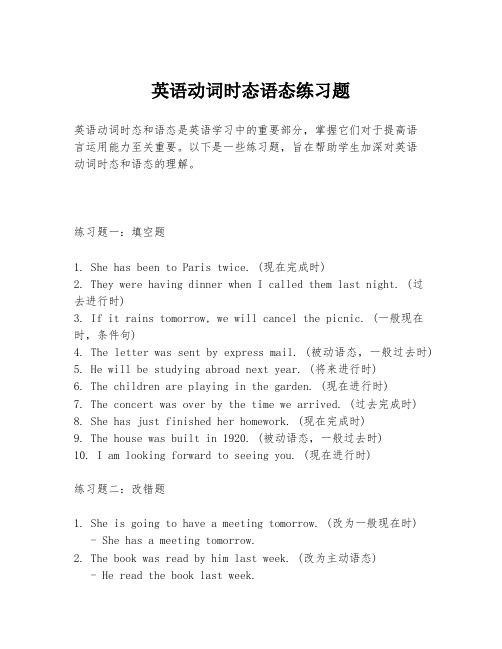
英语动词时态语态练习题英语动词时态和语态是英语学习中的重要部分,掌握它们对于提高语言运用能力至关重要。
以下是一些练习题,旨在帮助学生加深对英语动词时态和语态的理解。
练习题一:填空题1. She has been to Paris twice. (现在完成时)2. They were having dinner when I called them last night. (过去进行时)3. If it rains tomorrow, we will cancel the picnic. (一般现在时,条件句)4. The letter was sent by express mail. (被动语态,一般过去时)5. He will be studying abroad next year. (将来进行时)6. The children are playing in the garden. (现在进行时)7. The concert was over by the time we arrived. (过去完成时)8. She has just finished her homework. (现在完成时)9. The house was built in 1920. (被动语态,一般过去时)10. I am looking forward to seeing you. (现在进行时)练习题二:改错题1. She is going to have a meeting tomorrow. (改为一般现在时)- She has a meeting tomorrow.2. The book was read by him last week. (改为主动语态)- He read the book last week.3. They are working on the project since last month. (改为完成进行时)- They have been working on the project since last month.4. The flowers will be watered by me tomorrow. (改为主动语态) - I will water the flowers tomorrow.5. She was seen to enter the building by the security guard. (改为主动语态)- The security guard saw her enter the building.练习题三:填空题(使用正确的时态和语态)1. I am (be) very happy to hear from you.2. The project was (complete) successfully last month.3. They have been (live) in this city for five years.4. She is (write) a book about her travels.5. The problem will be (solve) by the team soon.6. The house was (build) in the 18th century.7. The children are (play) in the park right now.8. The report has (be) submitted to the manager.9. He will be (study) for his exams next week.10. The cake was (bake) by my mother yesterday.练习题四:翻译题1. 我昨天去了图书馆。
英语动词的时态解题技巧及练习题
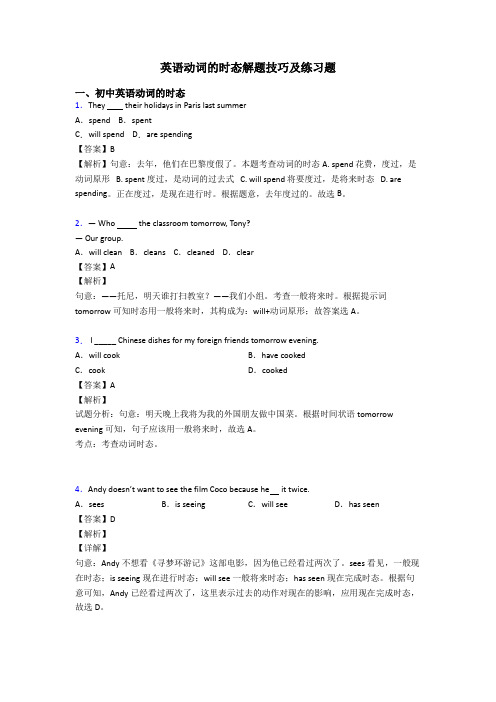
A.plant B.will plant C.planted D.plants
【答案】A
【解析】
【详解】
句意:五班的学生每年在公园植树。根据时间状语every year句子应该用一般现在时,句子的主语students是复数形式,所以谓语动词用原形。故选A。
【答案】D
【解析】句意:我起床的时候,妈妈已经做好早饭了。考查动词时态辨析题。by the time等到/到…时候为止,用于表示一段时间,主句需用完成时。根据从句时态(got是过去式),结合句意语境,可知用过去完成时,即had+过去分词结构,故选D。
11.(题文)—If you try hard, your dream will_______.
13.— Why did so many people get hurt in the earthquake?
— Don’t you know? Peoplewhen it happened that night.
A.slept B.have slept C.sleep D.were sleeping
【答案】B
【解析】
【详解】
句意:香港回归中国已有20年。明年我将在那里呆两周。考查动词时态辨析。for 20 years是一段时间,需和持续性动词连用;return返回,终止性动词,可排除AD两项。next year明年,用于一般将来时,可排除C项。根据句意结构和语境,可知选B。
6.---Helen, When did you moved here?
【答案】B
【解析】
【详解】
句意:——如果明天不下雨,我们就去野餐吧。——但是没有人知道明天会不会下雨。根据句意可知,第一个if是“如果”的意思,引导的是条件状语从句,if引导的条件状语从句的时态用一般现在时态表示将来,排除A,D选项;第二个if是“是否”的意思,引导的是宾语从句,根据时间状语tomorrow判断,从句的时态为一般将来时态,故答案为B。
动词时态语态考点及练习题

时态语态考点及练习考点1 一般时态★★★★★1. 一般现在时(1)表示现在的习惯性、经常性发生的动作或存在的状态, 常与表示频度的时间状语连用, 如usually, often, always, sometimes, every day等。
(2)表示客观事实、真理、格言或者警句等。
(3)表示按照时间表、方案安排好的或者规定的行为, 只限于go, come, leave, start, stop, arrive 等表示动作趋向性或移动意义的词。
The train leaves at six tomorrow morning. 这列火车明早六点出发。
(4)在时间、条件等状语从句中常用一般(现在)时代替一般将来时。
2. 一般过去时(1)表示过去某个时间发生的动作或存在的状态, 常用yesterday, last year, in 1995, the other day等作时间状语。
(2)在时间、条件等状语从句中常用一般过去时代替过去将来时。
He said he would not go if it rained.他说过如果下雨, 他不会去的。
【典题印证】—Hav en’t seen you for ages! Where have you been—I went to Ningxia and(stay)there for one year, teaching as a volunteer.3. 一般将来时(1)一般将来时表示将来某一时刻的动作或状态, 即单纯的将来事实。
(2)三类表示一般将来时的特殊构造:①be going to do sth. 表示方案、打算要做某事或者有预兆要发生某事。
The dark clouds are gathering, so it is going to rain.乌云密布, 眼看就要下雨了。
②be to do sth.表示按方案或安排即将要做某事, 或者按照职责、义务、规定等要做某事。
初中动词的四种基本时态及练习题

一般现在时一般现在时通常表示目前阶段经常发生的动作或存在的状态。
A.BE动词(am, is, are)1.are用于主语是复数名词,is用于主语是单数或不可数名词。
2.句型。
陈述句:The man under the tree is your cousin.一般疑问句:Are these your blue bags?Yes, they are. / No, they aren’t.特殊疑问句:Where is your pen pal from?B.实义动词1.如see, look, teach, brush, relax, study, watch, go等表示动作词,当主语为第三人称单数时,如he, she, your father, his classmate等时,动词形式要作如下3.句型变化(需借助助动词)肯定式:主语+动词原形/动词的第三人称单数否定式:主语+助动词don't/doesn't +动词原形+其他疑问式:Do/Does+主语+动词原形+其他简略回答: (肯)Yes,主语+do/does(否)No,主语+do/does not注意:have的第三人称单数为haseg. They go to movies on weekends.They don’t go to movies on weekends.Do they go to movies on weekends?Yes, they do. / No, they don’t.When do they go to movies?eg. He has some homework to do.Does he have any homework to do?Yes, he does. / No, he doesn’t.He doesn’t have any homework to do.What does he have?用法:1.表示事实,现状,性质或经常的,习惯的动作,常与often, usually, always, sometimes, today,every day,once a week, every five minutes, on Sundays等时间状语连用,eg. I often sleep late on Sundays.2.表示普遍真理. eg. The earth goes round the sun.3.表示在现在时间里所发生的一个动作.eg. Here comes the train.4.在时间和条件状语从句中,从句用一般现在时.eg. I'll go with you if you are free tomorrow.I’ll call you when she comes.练习题1. My English teacher _______about thirty years old,but he ______younger than he really is.A. is, look B .is, looks C. am, look2.Jim_____veryhard, but he _____till a little weak in Chinese.A. studies, isB. study, isC. doesn’t study, is3. We all know that the sun _____ round the earth.A. goesB. don’t goC. doesn’t go4.There____twelve months in a year and January___ first.A. is, comesB. are, comeC. are, comes5.Who _____ the kite best of all, Jim? Lucy or Lily?A .flies B. fly C .are flying6. ____ the Great Wall one of the places of great interests?A. WasB. DoC. Is7.____she____home at six o’clock every morning?A. Do, comesB. Does, ComeC. Do, come8. My mother______ like watching, so she ____ tobed very early every evening.A. doesn’t, goB. don’t goC. doesn’t , goes9.Mr Li usually _____newspapers after supper every day.A. readB. readingC. reads一般过去时一般过去时表示过去发生的动作或存在的状态,一般过去时通常由动词的过去式构成。
动词时态专项练习

动词时态专项练习一、一般现在时1. She ____(live) in London.答案:lives解析:一般现在时用于表示经常性、惯性或普遍性的动作或状态。
对于第三人称单数,动词需要加上-s结尾。
2. They ____(watch) TV every evening.答案:watch解析:主语是they,没有第三人称单数的规则,所以动词不需要加-s结尾。
二、一般过去时1. We ____(visit) the museum yesterday.答案:visited解析:一般过去时表示过去发生的动作或状态。
visit的过去式是visited。
2. He ____(play) football last weekend.答案:played解析:对于以字母e结尾的动词,一般过去时直接加-d结尾。
play的过去式是played。
三、一般将来时1. I ____(go) to the beach tomorrow.答案:will go解析:一般将来时用于表示将来要发生的动作或状态。
主语是第一人称单数,所以需要使用will + 动词原形。
2. They ____(have) a party next week.答案:will have解析:主语是第三人称复数,使用will + 动词原形构成一般将来时。
四、现在进行时1. She ____(read) a book right now.答案:is reading解析:现在进行时用于表示现在正在进行的动作。
构成方式为be动词 + 动词的ing形式。
第三人称单数使用is。
2. They ____(study) for the exam at the moment.答案:are studying解析:主语是第三人称复数,使用are构成现在进行时。
五、过去进行时1. He ____(watch) TV at 8 p.m. yesterday.答案:was watching解析:过去进行时用于表示过去某个时间正在进行的动作。
中考英语考点专项练习之动词的分类和时态篇(答案与解析)
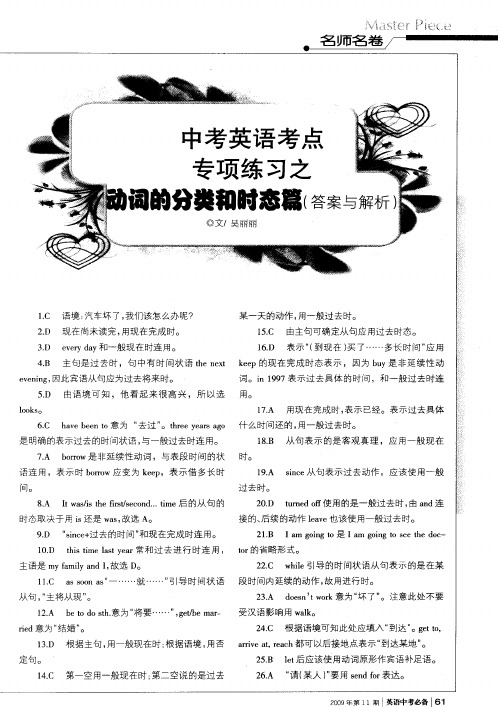
1 . s c 句 表 示 过 去 动 作 ,应 该 使 用一 般 9 A i e从 n
过 去时。
8A I w s s h r/eod t 后 的 从 句 的 . t a/ ef t cn … i it i s s me 时 态 取 决 于 用 i还 是 w s故 选 A。 s a, 9D “ic+ 去 的 时 间 ” 现 在 完成 时连 用 。 . s e 过 n 和
r d意 为 “ 婚 ” i e 结 。
2 . 根 据 语 境 可 知 此 处 应填 入 “ 达 ” e t, 4C 到 。gto
l . 根据主句 , 3D 用一般现在时 ; 据语境 , 根 用否 ar ea,ec 都可 以后接地点表示“ rv trah i 到达某地 ” 。
定句。
-
发 c。建,d写h。 i 。 “立 。 ’ I 。 分 p w “ d
发。
on
ig 式 作 宾语 补 足 语。 n形
2 . 由答话 tedyb f eys ra 可 知应是 8 B h a e r et d y o e
过去时。
2 . de 9D i 是非延续性动词 , 不能和“ r段时 间” f+ o 连用 ,eda b ed表状态, 可和“ r段时间 ” 用。 f+ 0 连
从 句 ,主 将从 现 ” “ 。
2 . dent ok意 为 “ 了 ” 3 A os ’ w r 坏 。注 意此 处 不 要
受汉 语 影 响 用 w l。 ak
l - b os . 为 “ 要 … … ”gt em r 2A et d t 意 o h 将 ,e b a- /
2 . lt 应 该 使 用动 词 原 形作 宾语 补 足 语 。 5 B e后
小学专项练习动词时态的练习题及

小学专项练习动词时态的练习题及以下是小学专项练习动词时态的练习题及答案。
一、时态认知练习1. 用现在进行时动词填空。
(a) The baby is _____ (cry) loudly.(b) The children are _____ (sing) a song.(c) The dog is _____ (run) after a ball.答案:(a) crying;(b) singing;(c) running2. 用一般现在时动词填空。
(a) My mother _____ (cook) dinner every night.(b) The sun _____ (rise) in the east.(c) We _____ (study) English at school.答案:(a) cooks;(b) rises;(c) study3. 用一般过去时动词填空。
(a) I _____ (watch) TV last night.(b) They _____ (play) soccer on the weekend.(c) She _____ (visit) her grandmother yesterday.答案:(a) watched;(b) played;(c) visited4. 用将来时动词填空。
(a) I _____ (go) to the movies tomorrow.(b) They _____ (have) a party next Friday.(c) We _____ (visit) our grandparents next month.答案:(a) will go;(b) will have;(c) will visit二、时态运用练习1. 阅读下面的对话,选择正确的动词填空,使对话意思完整。
A: What _____ (do) you usually do on the weekends?B: I _____ (play) basketball with my friends and _____ (watch) movies at home.A: That sounds fun. Why don’t we _____ (go) to the park and _____ (have) a picnic this Saturday?B: Great idea! I’d love to _____ (go)!答案:(A) do; (B) play, watch; (A) go, have; (B) go2. 根据上下文,选择正确的动词填空,完成短文。
二年级英语下册动词的时态专项练习
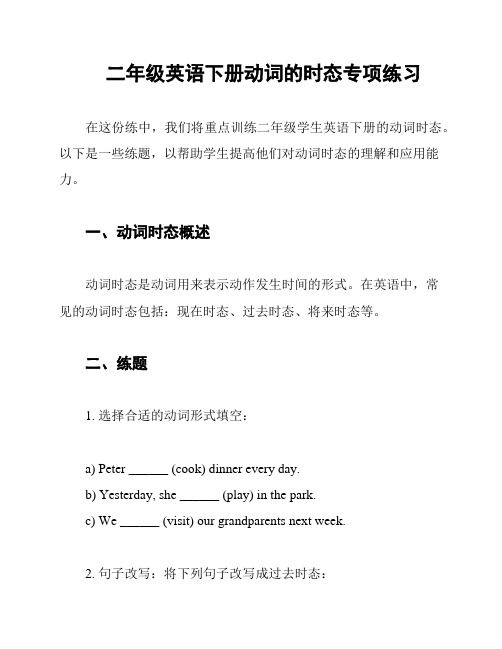
二年级英语下册动词的时态专项练习在这份练中,我们将重点训练二年级学生英语下册的动词时态。
以下是一些练题,以帮助学生提高他们对动词时态的理解和应用能力。
一、动词时态概述动词时态是动词用来表示动作发生时间的形式。
在英语中,常见的动词时态包括:现在时态、过去时态、将来时态等。
二、练题1. 选择合适的动词形式填空:a) Peter ______ (cook) dinner every day.b) Yesterday, she ______ (play) in the park.c) We ______ (visit) our grandparents next week.2. 句子改写:将下列句子改写成过去时态:a) She reads a book every day.b) They go to school by bus.c) I eat an apple in the morning.3. 根据所给的时间提示,用适当的时态填空:a) I ______ (watch) a movie tomorrow.b) They ______ (have) a party last night.c) We ______ (go) to the beach next weekend.4. 根据图片和动词的时态写出句子:a) ______ (Jump) ______ (high)!b) ______ (Run) ______ (fast)!三、答案1. 选择合适的动词形式填空:a) cooksb) playedc) will visit2. 句子改写:将下列句子改写成过去时态:a) She read a book yesterday.b) They went to school by bus.c) I ate an apple in the morning.3. 根据所给的时间提示,用适当的时态填空:a) will watchb) hadc) will go4. 根据图片和动词的时态写出句子:a) Jump high!b) Run fast!以上是二年级英语下册动词的时态专项练习,希望能够帮助学生提高对动词时态的认识和运用能力。
动词的分类及用法作业--动词练习题
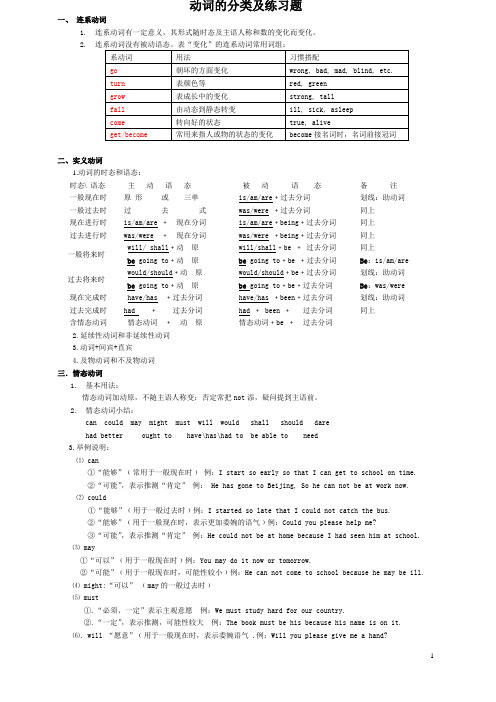
动词的分类及练习题一、 连系动词1. 连系动词有一定意义,其形式随时态及主语人称和数的变化而变化。
2. 连系动词没有被动语态。
表“变化”的连系动词常用词组:系动词 用法习惯搭配go 朝坏的方面变化 wrong, bad, mad, blind, etc. turn 表颜色等 red, green grow 表成长中的变化 strong, tall fall 由动态到静态转变 ill, sick, asleep come 转向好的状态true, aliveget/become常用来指人或物的状态的变化become 接名词时,名词前接冠词二、实义动词1.动词的时态和语态:2.延续性动词和非延续性动词3.动词+间宾+直宾4.及物动词和不及物动词 三.情态动词1. 基本用法:情态动词加动原,不随主语人称变;否定常把not 添,疑问提到主语前。
2. 情态动词小结:can could may might must will would shall should dare had better ought to have\has\had to be able to need3.举例说明: ⑴ can①“能够”﹙常用于一般现在时﹚ 例:I start so early so that I can get to school on time. ②“可能”,表示推测“肯定” 例: He has gone to Beijing, So he can not be at work now. ⑵ could①“能够”﹙用于一般过去时﹚例:I started so late that I could not catch the bus.②“能够”﹙用于一般现在时,表示更加委婉的语气﹚例:Could you please help me?③“可能”,表示推测“肯定” 例:He could not be at home because I had seen him at school. ⑶ may①“可以”﹙用于一般现在时﹚例:You may do it now or tomorrow.②“可能”﹙用于一般现在时,可能性较小﹚例:He can not come to school because he may be ill. ⑷ might:“可以” ﹙may 的一般过去时﹚ ⑸ must 时态\ 语态 主 动 语 态 被 动 语 态 备 注 一般现在时 原 形 或 三单 is/am/are ﹢过去分词 划线:助动词 一般过去时 过 去 式 was/were ﹢过去分词同上现在进行时 is/am/are ﹢ 现在分词 is/am/are ﹢being ﹢过去分词 同上 过去进行时 was/were ﹢ 现在分词 was/were ﹢being ﹢过去分词 同上 一般将来时 will/ shall ﹢动 原 will/shall ﹢be ﹢ 过去分词 同上be going to ﹢动 原 be going to ﹢be ﹢过去分词 Be :is/am/are 过去将来时 would/should ﹢动 原 would/should ﹢be ﹢过去分词 划线:助动词 be going to ﹢动 原 be going to ﹢be ﹢过去分词 Be :was/were 现在完成时 have/has ﹢过去分词 have/has ﹢been ﹢过去分词 划线:助动词 过去完成时 had ﹢ 过去分词 had ﹢ been ﹢ 过去分词 同上 含情态动词情态动词 ﹢ 动 原情态动词﹢be ﹢ 过去分词①.“必须、一定”表示主观意愿例:We must study hard for our country.②.“一定”,表示推测,可能性较大例:The book must be his because his name is on it.⑹.will “愿意”﹙用于一般现在时,表示委婉语气 .例:Will you please give me a hand?⑺.would“愿意”:用于一般现在或一般过去时,比will语气更委婉.例:Would he like something to eat?⑻.shall“愿意”:用于一般现在时,表示委婉语气适用于主语是第一人称。
- 1、下载文档前请自行甄别文档内容的完整性,平台不提供额外的编辑、内容补充、找答案等附加服务。
- 2、"仅部分预览"的文档,不可在线预览部分如存在完整性等问题,可反馈申请退款(可完整预览的文档不适用该条件!)。
- 3、如文档侵犯您的权益,请联系客服反馈,我们会尽快为您处理(人工客服工作时间:9:00-18:30)。
动词时态一、一般现在时:概念:经常、反复发生的动作或行为及现在的某种状况。
时间状语:often,usually,always,sometimes,every week(day,year,month…),once a week,on sundays,…基本结构:①be动词am/is/are;②行为动词原形或单数第三人称。
否定形式:① am /is /are +________;②此时态的谓语动词若为行为动词,则在其前加_________,如主语为第三人称单数,则用___________,同时还原行为动词。
一般疑问句:①把be动词放于句首;②用助动词 do提问,如主语为第三人称单数,用does,同时,还原行为动词。
【注意】 ______状语从句和_______状语从句中, 从句用___________时态表示将来。
自我检测:1.The Greens usually _____ TV on Sunday evening.A. watchB. watchesC. are watchingD. is watching2. Mr Black often _____ fishing on Sundays, _____ he ?A. goes…doesn'tB. goes…isn'tC. don't go…doesD. doesn't go…is3. We will go shopping if it___ tomorrow.A don't rainB didn't rainC doesn't rainD isn't rain4. I will tell him as soon as he _____ backA. comeB. comesC. will comeD. came5. He said the sun ____in the east and ____in the west.A rose; setB rises; setsC rises, setD rise; sets二、一般过去时:概念:过去某个时间里发生的动作或状态;过去习惯性、经常性的动作、行为。
时间状语:ago,yesterday,the day before yesterday,last week(year,night,month...),in 1989,just now,at the age of 5,one day,long long ago,once upon a time,…基本结构:①be动词过去式was/were;②行为动词过去式。
否定形式:①was/were +not;②在行为动词前加___________,同时还原行为动词。
一般疑问句:①was或were放在句首;②用助动词do的过去式_____提问,还原动词。
自我检测:1. I ____ very hard when I was young.A. studyB. studiedC. had studiedD. shall study2. ___ he ___ a good time last Sunday?A. Were; wereB. Did; doC. Did; hasD. Did; have3.---When__you come here? ---We__here last week.A.do;comeB.do;cameC.did;cameD.did;come4. We _____the floor and _____ all the windows.A. mopped;cleannedB. moped; cleanedC. mopped;cleanedD. moped; cleaned5. ---____ you _____out for a walk after supper ? ---Yes, I ______.A. Did…went,wentB. Did… go,wentC. Did… went,didD. Did… go,did6. Paper _____ first invented in China.A. isB. areC. wasD. were三、现在进行时:概念:表示现阶段或说话时正在进行的动作及行为。
时间状语:now,at this time,these days,…基本结构:am/is/are +_____________ 否定形式:__________________________ 一般疑问句:把______动词放在句首【注意】短暂性动词如leave, begin, come, go, die等,可用_____________时表示将来。
自我检测:1. ---What is he doing now? ---He___a picture.A. drawsB. drewC. is drawingD. was drawing2. Don’t talk here. Grandparents ___.A. sleepB. is sleepingC. are sleepingD. slept3. Look ! The boy students are _____ football while the girls are _____ .A. playing; danceB. playing; dancingC. play; dancingD. play; dance4. Some are ______ in the river and some are ______ games.A. swimming; playingB. swimming;plaiingC. swiming; playingD. swiming;plaing5. Mr Smith _____ short stories, but he ____ a TV play these days.A. is writing;is writingB. is writing; writesC. writes;is writingD. writes;writes6. ___ your mother ___ shopping at the moment?A. Are; doingB. Is; doingC. Is; takingD. Are; taking四、过去进行时:概念:表示过去某段时间或某一时刻正在发生或进行的行为或动作。
这一特定的过去时间除有上下文暗示以外,一般用表示过去时间的状语来表示。
时间状语:at this time yesterday,at that time或以when引导的谓语动词是一般过去时的时间状语等。
基本结构:_______________________ 否定形式:_______________________一般疑问句:把was或were放在句首自我检测:1. I ______ a letter at nine last night.A. am writingB. was writingC. wroteD. is writing2. I _____ myself French from 7 to 9 yesterday morning. I _____ to work.A. was teaching;didn't goB. taught; didn't goC. was teaching;wentD. taught;went3. This time yesterday Jack _____ his bike. He _____ TV.A. repaired; didn't watchB. was repairing;watchedC. repaired;watchedD. was repairing;wasn't watching4. When you _____ at the door, I _____ some washing.A. knocked; didB. was knocking;didC. knocked;was doingD. knock;am doing5. The boy_____ English on the radio when I _____ his door.A. learned;was openingB. was learning;openedC. learned;openedD. is learning;open6. A young man _____ her while she _____ her work .A. watched;was doingB. was watching; didC. watched;didD. was watching;was doing五、一般将来时:概念:表示将要发生的动作或存在的状态及打算、计划或准备做某事。
时间状语:tomorrow,next day(week,month,year…),soon,in a few minutes, the day after tomorrow,…基本结构:①am/is/are going to +do;②will/shall+do否定形式:①am/is/are +not+going to +do;② will/shall+not+do一般疑问句:①be放于句首;② will/shall提到句首【注意】(1) 助动词“will + 动词原形”可用于_____人称, 助动词 shall常用在___________人称后。
(2)“________________+ 动词原形”表示即将发生某事或人为计划要做某事。
表意愿的将来、问对方是否愿意、表客气的邀请或命令及表客观将来时,用_________。
自我检测:1. He ____ very busy this week, he _____ free next week.A. will be; isB. is; isC. will be; will beD. is; will be2. He ______ in his garden every morning next year.A. will workB. worksC. workedD. is working3.--- ___ you ___ free tomorrow? ---No. I ____ free the day after tomorrow.A. Are; going to; willB. Are; going to be; willC. Are; going to; will beD. Are; going to be; will be4. He ______ in three days.A. coming backB. came backC. will come backD. comes back5. If he ______ to college, he _____ a lot more.A. will go…will learnB. will go…is going to learnC. is going… is going to learnD. goes… will learn6. When she _____ next time ,I ______ her everything.A. is going to come…shall tellB. will come…shall tellC. comes…will tellD. comes…tell7. There ___ a meeting tomorrow afternoon.A. will be going to beB. is going to haveC. is going to beD. will have8. ---Let’s go out to play football, shall we? ---OK. I _____.A. will comingB. be going to comeC. comeD. am coming9. It ___ us a long time to learn English well.A. tookB. will takeC. spendsD. will spend六、过去将来时:概念:立足于过去某一时刻,从过去看将来,常用于宾语从句中。
